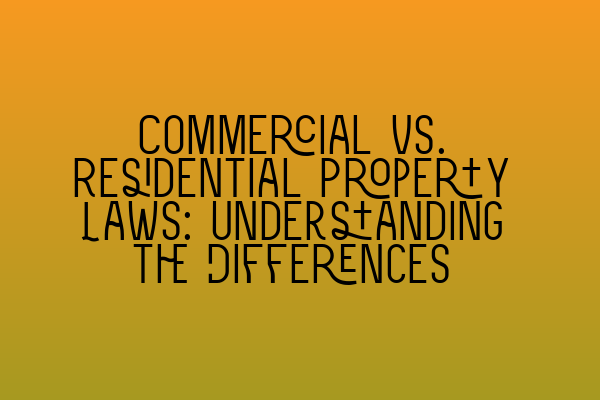Commercial vs. Residential Property Laws: Understanding the Differences
Welcome to SQE Property Law & Land Law’s blog! As solicitors specializing in property law, we understand that navigating the legal aspects of real estate can be complex and overwhelming. In this blog post, we will explore the key differences between commercial and residential property laws, helping you to gain a better understanding of the intricacies involved in each.
Commercial Property Laws
Commercial property laws refer to the legal framework that governs the buying, selling, and leasing of properties used for commercial purposes. This includes office spaces, retail units, warehouses, and industrial facilities. The primary objective of commercial property laws is to ensure a fair and transparent environment for businesses to operate in.
One essential aspect of commercial property laws is the necessity for landlords and tenants to enter into comprehensive lease agreements. These contracts outline the terms and conditions of the tenancy, including the rent amount, lease duration, maintenance responsibilities, and dispute resolution mechanisms. It is crucial for all parties involved to seek legal advice to ensure their rights and obligations are adequately protected.
Commercial property laws also cover aspects such as zoning regulations, planning permissions, and environmental considerations. These regulations help to maintain the harmony between businesses, neighboring properties, and the community at large. Property developers and investors must adhere to these laws to avoid legal complications and protect their investments.
For more information on related contract law topics, we recommend checking out our articles:
- Misrepresentation in Contracts: Unveiling Deceptive Practices
- A Closer Look at SQE Contract Law Syllabus
- SQE Contract Law: Analyzing Landmark Cases and Influential Judicial Decisions
Residential Property Laws
Residential property laws, on the other hand, govern the buying, selling, and leasing of properties intended for residential use, such as houses, apartments, and condominiums. These laws are put in place to protect the rights and interests of both landlords and tenants, ensuring a safe and secure living environment.
In the residential property sector, tenancy agreements play a significant role. These agreements outline the rights and responsibilities of both landlords and tenants, covering aspects such as rent, security deposits, notice periods, and property maintenance. It is essential for both parties to understand their rights and obligations to prevent disputes and ensure a harmonious tenancy.
Furthermore, residential property laws often include regulations regarding fair housing practices, anti-discrimination measures, and habitability standards. These laws aim to promote equality and fair treatment among tenants, protecting them from unfair practices and maintaining satisfactory living conditions.
To expand your knowledge on contractual capacity and to test your understanding, we recommend checking out our related articles:
- Understanding Contractual Capacity: Rights and Limitations
- Interactive SQE Mock Tests for Contract Law: Test Your Knowledge
Conclusion
Understanding the differences between commercial and residential property laws is essential for anyone involved in the real estate industry. Whether you are a business owner, landlord, tenant, or investor, having a solid grasp of these legal frameworks will help you protect your rights, make informed decisions, and navigate the complexities of property transactions.
If you require legal assistance or advice regarding commercial or residential property matters, our team of experienced solicitors at SQE Property Law & Land Law is ready to assist you. We specialize in property law and have a deep understanding of the intricacies involved in both commercial and residential transactions. Contact us today to schedule a consultation.
